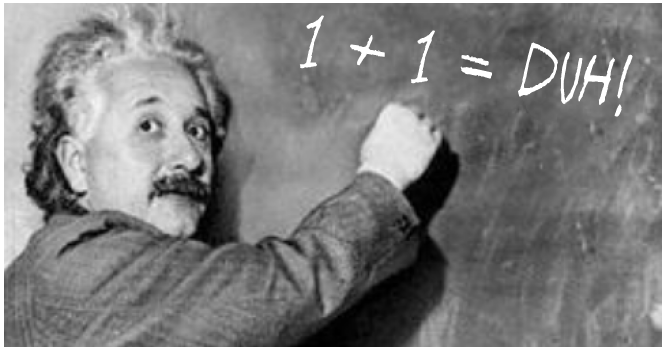 I WORK
FOR YOU
I WORK
FOR YOU


CIVIL CODE
1549. A contract
is an agreement to do or not to do a certain thing.
CALIFORNIA GOVERNMENT CODE
DIVISION
5. PERSONNEL
PART 2. STATE CIVIL
SERVICE
19572.
Each of the following constitutes cause for discipline of an employee,
or of a person whose name appears on any employment list:
(a) Fraud in
securing appointment.
(b) Incompetency.
(c)
Inefficiency.
(d) Inexcusable
neglect of duty.
(e) Insubordination.
(f) Dishonesty.
(g) Drunkenness on
duty.
(h) Intemperance.
(i) Addiction to
the use of controlled substances.
(j) Inexcusable
absence without leave.
(k) Conviction of a
felony or
conviction of a misdemeanor involving moral turpitude. A plea or
verdict of guilty, or a conviction following a plea of nolo contendere,
to a charge of a felony or any offense involving moral turpitude is
deemed to be a conviction within the meaning of this section.
(l) Immorality.
(m) Discourteous
treatment of the public or other employees.
(n) Improper
political activity.
(o) Willful
disobedience.
(p) Misuse of state
property.
(q) Violation of
this part or of a board rule.
(r) Violation of
the prohibitions set forth in accordance with Section 19990.
(s) Refusal to take
and subscribe any
oath or affirmation that is required by law in connection with the
employment.
(t) Other failure
of good behavior
either during or outside of duty hours, which is of such a nature that
it causes discredit to the appointing authority or the person's
employment.
(u) Any negligence,
recklessness, or
intentional act that results in the death of a patient of a state
hospital serving the mentally disabled or the developmentally disabled.
(v) The use during
duty hours, for
training or target practice, of any material that is not authorized for
that use by the appointing power.
(w) Unlawful
discrimination, including
harassment, on any basis listed in subdivision (a) of Section 12940, as
those bases are defined in Sections 12926 and 12926.1, except as
otherwise provided in Section 12940, against the public or other
employees while acting in the capacity of a state employee.
(x) Unlawful
retaliation against any
other state officer or employee or member of the public who in good
faith reports, discloses, divulges, or otherwise brings to the
attention of, the Attorney General or any other appropriate authority,
any facts or information relative to actual or suspected violation of
any law of this state or the United States occurring on the job or
directly related to the job.
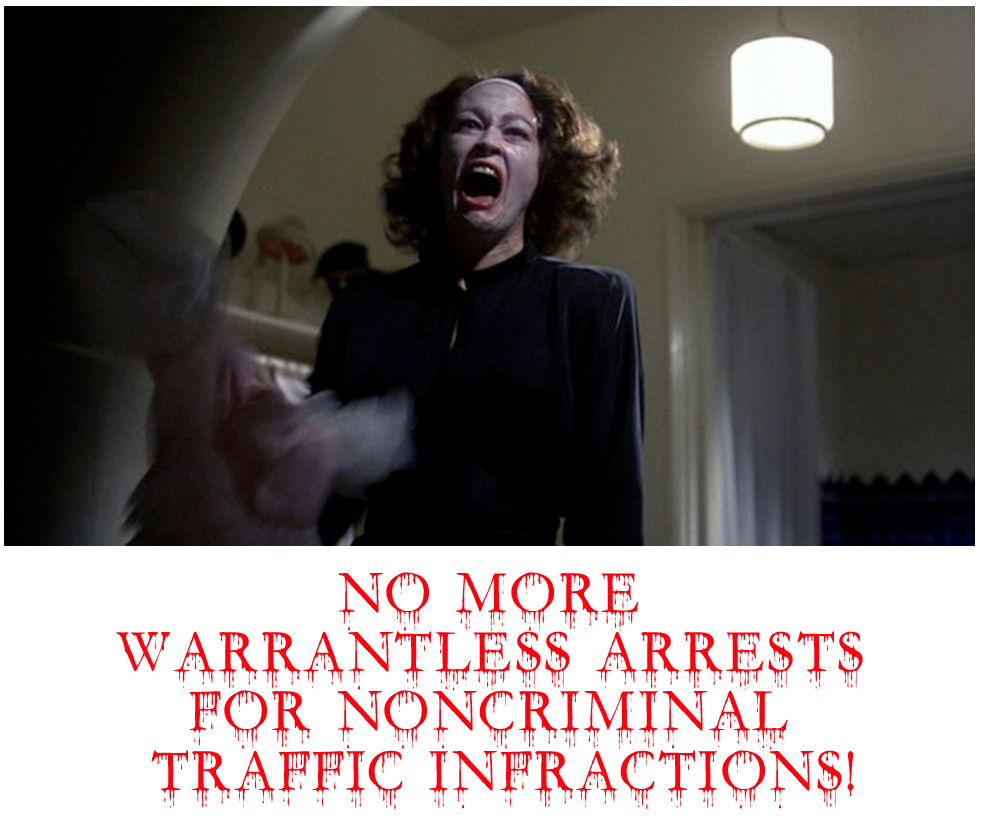
 FOR UNAUTHORIZED
POLCE CONDUCT
IF THE "STOP" ISN'T AUTHOIRZED THEN HOW CAN IT BE
REASONABLE?
FOR UNAUTHORIZED
POLCE CONDUCT
IF THE "STOP" ISN'T AUTHOIRZED THEN HOW CAN IT BE
REASONABLE?
MAGNA
CARTA
1215

APPARENTLY
HARLEYS WEREN'T EXPENSIVE ENOUGH
 Please don't pull us over officer.
We're just on vacation.
Please don't pull us over officer.
We're just on vacation.
The
rationale upon which the "reasonable suspicion " doctrine is based, a
doctrine that thwarts the notion of liberty and freedom from state
intrusion in a mobile society, must be founded on an objective basis
for suspecting that a particular person is engaged in criminal
activity, lest we "sweep many ordinary citizens into a generality of
suspicious appearance merely on hunch." Rodriguez, 976 F.2d at 596.
Reasonable suspicion can not rest upon the hunch of an
experienced officer, even if the hunch turns out right.
USA v
JIMINEZ
MEDINA (1999) No. 97-10055 U.S. 9th Circuit Court of
Appeals
...infractions are not crimes...
...the Legislature did not intend to classify infractions as crimes.
FN 1. Battle soundly reasoned infractions are not crimes;...
People
v. Sava (1987) 190 Cal.App.3d 935
We
conclude that, in the circumstances of this case, probable cause to
believe that there had been a traffic infraction or non-criminal
violation was insufficient to justify an impoundment of a vehicle
parked in the owner’s driveway, in the absence of a valid caretaking
purpose.
MIRANDA
v. CITY OF CORNELIUS (2005) No. 04-35940, 9th
Cir. Court of Appeals
Justice
Scalia delivered the opinion of the Court. In this
case we
decide whether the temporary detention of a motorist who the police
have probable cause to believe has committed a civil traffic violation
is inconsistent with the Fourth Amendment's prohibition against
unreasonable seizures unless a reasonable officer would have been
motivated to stop the car by a desire to enforce the traffic laws.
WHREN
et al. v. UNITED STATES (1996), 517 U.S. 806
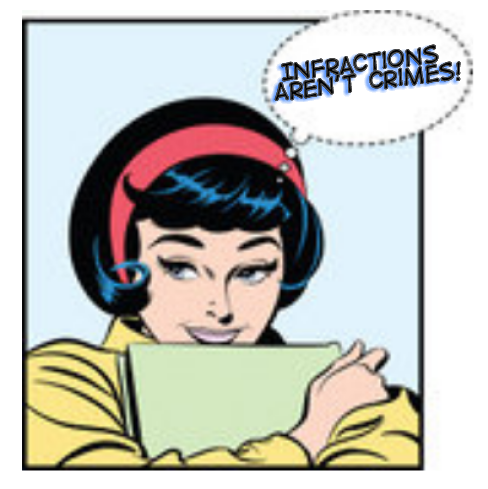

SUFFICIENT
EVIDENCE
The
prosecution, the accuser, has to prove with sufficient evidence beyond
a reasonable doubt, the party they have accused of a crime has
committed a crime. In absence of sufficient evidence the
accused
can not be found guilty of committing a crime. If you've
gotten
this far then you've seen evidcence establishing that the Legislateure
never intended infractions to be crimes. The Sava
holding supports that as does the proud admission by the Judicial
Council of their sponsoring the legislation creating the noncriminal
traffic infraction in their 2001 Annual Report.
Everybody knows if you get rid of the engine that whatever's behind the
engine will not go anywhere. I'd suggest applying that
concept
to what people call a "traffic stop" and how to deal with it if you
believe Mr. Law Enforcement Officer got it wrong. So first
things first, what's the engine? What in fact
started the
train you're on rollin down the tracks to the destination of
Empty Your
Walletville?
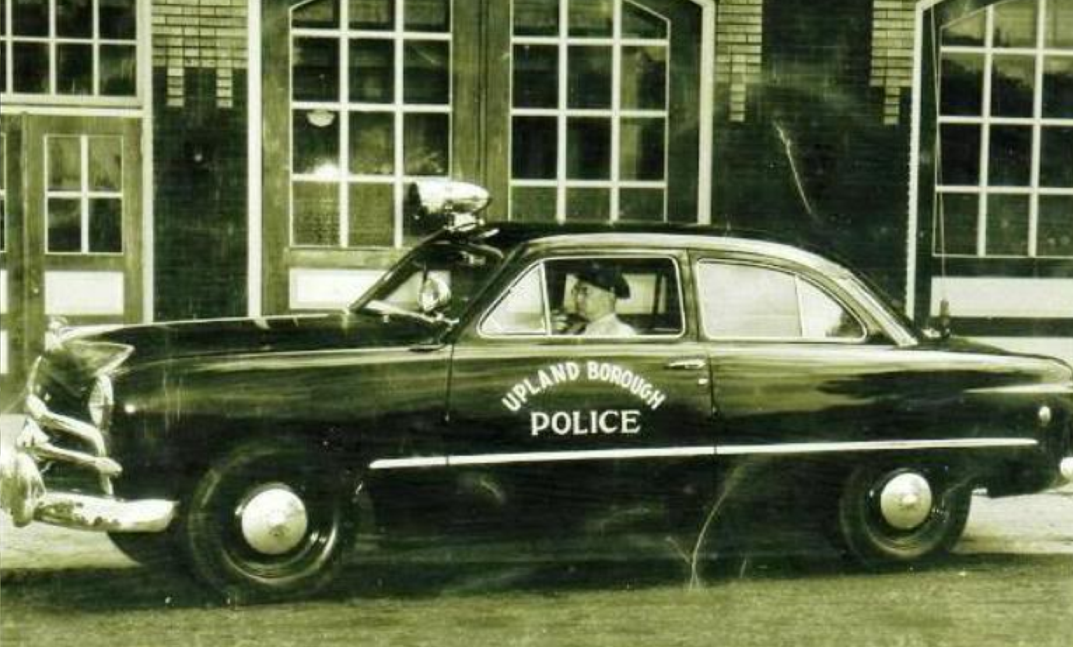 The answer is sitting in that car.
The answer is sitting in that car.


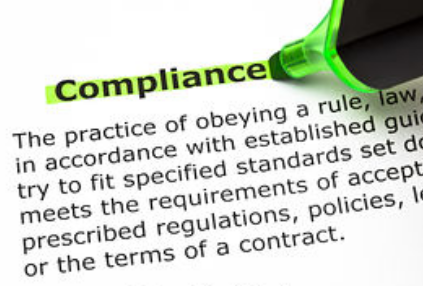 BREAK
THE LAW =
FAILURE
TO COMPLY =
FAILURE
TO PERFORM SPECIFICALLY
=
SIN
BREAK
THE LAW =
FAILURE
TO COMPLY =
FAILURE
TO PERFORM SPECIFICALLY
=
SIN
 Grocery shopping?! Yeah
right! Gimme your license punk!
Grocery shopping?! Yeah
right! Gimme your license punk!
Law
enforcement employees are prohibited from breaking the laws they swore
an oath to enforce. They have both an employment contract
and an
oath that imposes a mandatory duty upon them not to deny or prejudice
the secured rights of the people they serve. They
have both an employement contract and an oath that requires them to
comply with the laws they enforce, when they don't they are liable in
damages to the party who's rights were denied or prejudiced.
Stated
another way, law enforcment officers don't get to be hypocrites and
break the law.
When
you're subjected to a so-called "traffic stop" and issued a NOTICE TO
APPEAR, you're being accused of INFIDELITY TO THE LAW. It's
a
type of adultry if you will. Your accuser is always a
municipal
government employee, either State or local, but they're an employee.
So your employee has accused you of infidelity.
The good news is that's true or false.
If it's true
then you have a problem, if it's not then your employee has a problem.
Obviously you're gonna put your money on the bet that the
employee is wrong. But this isn't gambling.
There's
rules that the employess agreed to follow. When they don't
comply they're in breach. Dicipline is provided when the
employees deviate from the rules and regulations that apply to them.
This
is precisely what a so-called "traffic stop" is, it's a DICIPLINARY
ACTION based on the employee's evaluation of your conduct.
It's
just that simple. Had the employee presumed his or her
evaluation of your conduct not being in violation of the law, then he
or she would not have activated the patrol vehicle's red lights and
caused you to stop. Ipso
facto, the red
lights are evidence the employee presumed you were in violation of a
law. That presumption is rebuttable
or conclusive.
If
it were me, and I was accused of an infraction, I'd set about rebutting
the presumption because it's the rebuttable type, not the conclusive
type. What that means is READING THE RULES to
determine
HOW TO!

 YOU DIDN’T!
YOU DIDN’T!
YOU WERE REQUIRED
AND DIDN'T!
YOU'RE GONNA PAY!
Hey
folks, that's what the
so-called traffic stop" boils down to. That's what the cops
believe, the judges, commissioners, and pro tems, and attorneys and
paralegals believe, as well as the vast majority of everyone else.

They, the
employees on THE
PEOPLE'S GOVERNMENT PAYROLL, don't want the People, their EMPLOYER, to
know that the entire so-called "traffic stop" system is based on fraud.
What people believe is a "traffic stop" is a warrantless
arrest.
If you didn't know that then you've been mislead by everyone
who's ever called it that because that's not what it is.
It's an
ARREST. Period! That's how it's defined in the
Vehicle
Code itself.
There's rules provided by the
Legislature that apply to law enforcment
officers who choose to enforce the Vehicle Code. That's
correct,
every so-called "traffic stop" is an arrest and when it's made without
a warrant it's a "warrantless arrest", not a "traffic stop".
The term "traffic stop" is slang. That
term is not
utilized nor defined in the Vehicle Code because that's not what it's
called. It's an ARREST. The government
employee
better pray to his or her God that they correctly interpreted what they
observed because if what they observed was not a crime, they lose their
qualified immunity from a suit for damages for denial and prejudice of
the very rights they applied for the job to protect and the oath they
swore that they would. Denying the rights they swore not to
deny
is not protecting them so they violate the terms of their employment
contract and oath of office. Golly.
By the
way, when you actually
read the rule that applies to law enforcement employees who make
arrests without a warrant, you'll see they ARE NOT REQUIRED to arrest
anyone without a warrant. California
Penal Code section 836(a)(1).
Given
it's an arrest it kinda
sets out what the defense might be. But I doubt
the
majority of people know they've been arrested when stopped and issued a
NOTICE TO APPEAR for some alleged infraction of the Vehicle Code, so
they probably wouldn't make an "arrest" argument instead going with
something else tried and true like "I wasn't goin that fast your
honor". People who'd make that assertion have no
awareness
they just ADMITTED THEY WERE SPEEDING.
The funny thing is, an infraction
isn't even a crime and no one seems to mind, but if it's not a crime,
and the accuser's burden of proof is proof beyond a reasonable doubt of
crime, how can you possibly lose? Ask anyone if they want to
beat a ticket and you won't have to listen too closely to hear their
answer, and it's always the same. Unless they're a moron.
The good
news is there's RULES
FOR ARRESTS that apply to government employees. You've seen a
pretty important one just a bit ago. The even more
good news is the rules for arrests that apply to police, highway
patrol, and Sheriff deputies when making one for an alleged violation
of the Vehicle Code, are conveniently located in the Vehicle Code
itself.
Our
Legislators worked almost tirelessly to stick some rules
for the cops right in the book they enforce so they didn't have to look
around for em. Wasn't that nice?!
 YOUR LAW
ENFORCEMENT EMPLOYEES DO.
OR DO THEY?
YOUR LAW
ENFORCEMENT EMPLOYEES DO.
OR DO THEY?

 THERE ARE RULES IN THOSE BOOKS THAT APPLY TO US.
DO YOU KNOW WHAT THEY ARE?
THERE ARE RULES IN THOSE BOOKS THAT APPLY TO US.
DO YOU KNOW WHAT THEY ARE?
IT'S BEST IF YOU DON'T BECAUSE IT MAKES MISLEADING YOU EASIER.
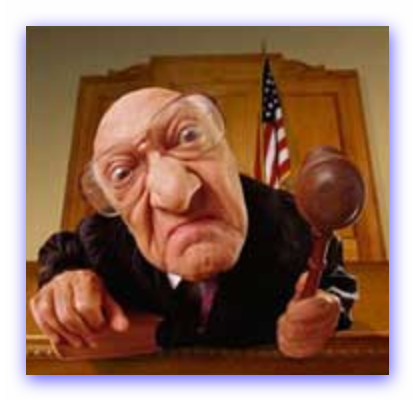 YOU GOT A PROBLEM WITH THAT?
YOU GOT A PROBLEM WITH THAT?


Who's Got
MOTIVE & OPPORTUNITY
To Cheat?
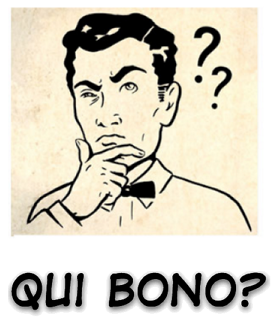

 $45 MILLION BUCKS ANNUALLY TO YELL AT PEOPLE
$45 MILLION BUCKS ANNUALLY TO YELL AT PEOPLE

California Code of Judicial Ethics
CANON 3
A JUDGE SHALL PERFORM THE DUTIES
OF
JUDICIAL OFFICE IMPARTIALLY AND DILIGENTLY
B. Adjudicative
Responsibilities
(4)
A judge shall be patient, dignified, and courteous to
litigants,
jurors, witnesses, lawyers, and others with whom the judge deals in an
official capacity, and shall require* similar conduct of lawyers and of
all court staff and personnel* under the judge's direction and control.
(5)
A judge shall perform judicial duties without bias or
prejudice.
A judge shall not, in the performance of judicial duties, engage in
speech, gestures, or other conduct that would reasonably be perceived
as (1) bias or prejudice, including but not limited to bias or
prejudice based upon race, sex, religion, national origin, disability,
age, sexual orientation, or socioeconomic status, or (2) sexual
harassment.
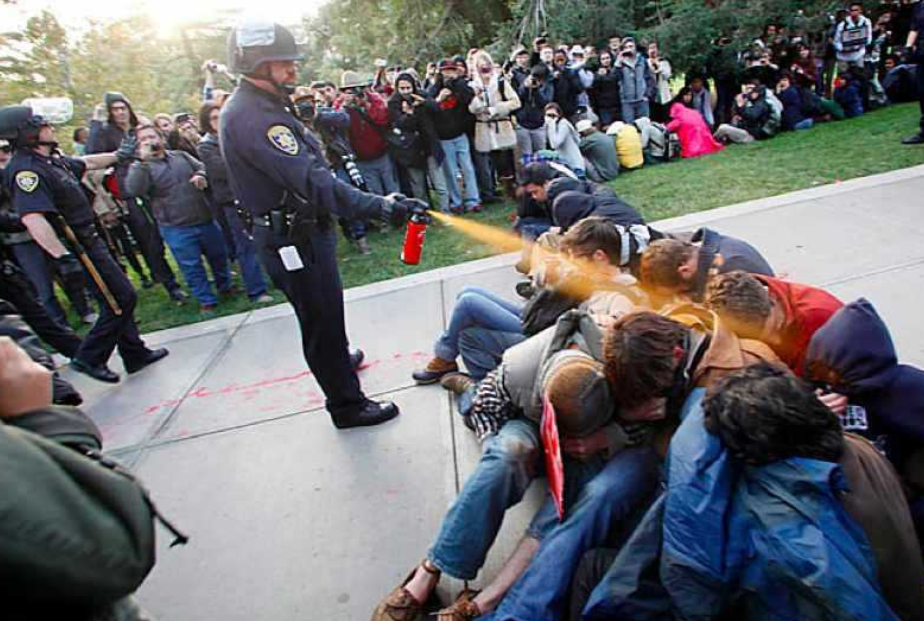 Whatever he's getting paid it's far too much.
The only thing he should be getting paid for is making
license plates.
Whatever he's getting paid it's far too much.
The only thing he should be getting paid for is making
license plates.
 They really can be quite likeable once you get to
know them.
They really can be quite likeable once you get to
know them.



Even
if the officer is not expected to know the law of all 50 states, surely
he is expected to know the California Vehicle Code...
CLEMENT
v. J & E SERVICE INC. (2008) No.
05-56692, UNITED STATES COURT OF APPEALS FOR THE NINTH CIRCUIT
Even
if the officer is not expected to know the law of all 50 states, surely
he is expected to know the California Vehicle Code,...
THE
PEOPLE v.
JESUS SANTOS SANCHEZ REYES (2011) 196 Cal.App.4th 856
CALIFORNIA VEHICLE CODE
DIVISION 17. OFFENSES AND PROSECUTION
CHAPTER 2. PROCEDURE ON ARRESTS
Article 1. Arrests
.......................................... 40300 - 40313
40300.
The provisions of this chapter shall govern all peace officers in
making arrests for violations of this code without a warrant for
offenses committed in their presence,...*
40500.
(a) Whenever
a person is arrested for any violation of this code not declared to be
a felony, or for a violation of an ordinance of a city or county
relating to traffic offenses and he is not immediately taken before a
magistrate, as provided in this chapter, the arresting officer shall
prepare in triplicate a written notice to appear in court or before a
person authorized to receive a deposit of bail, containing the name and
address of the person, the license number of his or her vehicle, if
any, the name and address, when available, of the registered owner or
lessee of the vehicle, the offense charged and the time and place when
and where he shall appear. If the arrestee does not have a
driver's license or other satisfactory evidence of identity in his or
her possession, the officer may require the arrestee...
40504.
(a)
The officer shall deliver one copy of the notice to appear to the
arrested person and the arrested person in order to secure release must
give his or her written promise to appear in court...
Thereupon,
the arresting officer shall forthwith release the person arrested from
custody.
That's
right, it's not a "traffic stop" which everyone is scared shitless of,
no, it's even worse, it's a CUSTODIAL ARREST. There's your
proof
right there provided by your legislative employees. They
wrote
that and they meant what they wrote. Feel like a dumb ass?
Keep calling things what they aren't. Keep using
the
wrong definitions and you'll continue to be a success at
failing.
Why isn't that information taught to the kids?
Everybody
knows full well they're gonna want to use a car but why
do parents and teachers tolerate children not being taught the rules
they KNOW exist? WHY
WASN'T THIS TAUGHT TO YOU? Ashton Kutcher needs to
revitalize
PUNK'D and focus on the driver license and "traffic stop" scam?
In fact it's
even worse than people realize! Take a look at what these courts
determined and held:
“...the display of emergency lights effected a detention...”
People v. Bailey (1985) 176 Cal. App. 3d 402
We conclude Brown was detained when the emergency lights were activated.
“We see little
difference, from the perspective of the occupants in the
vehicle,[between] turning on the blue lights behind a moving vehicle
and turning on the blue lights behind a parked vehicle. The
lights still convey the message that the occupants are not free to
leave.”
Brown was detained when Geasland stopped behind the parked car and turned on his emergency lights.
“[W]here a reasonable
suspicion of criminal activity exists, ‘the public rightfully expects a
police officer to inquire into such circumstances “in the proper
exercise of the officer's duties.”’” (People v. Wells (2006) 38 Cal.4th
1078, 1083 [45 Cal. Rptr. 3d 8, 136 P.3d810] (Wells), quoting In re
Tony C. (1978) 21 Cal.3d 888, 894 [148 Cal.Rptr. 366, 582 P.2d 957].)
But for the use of the emergency lights, the encounter would have been consensual.
People v. Brown (2015) 61 Cal. 4th 968, Supreme Court of California
[Kamala Harris was the AG at the time!]
Even where police officers stop a moving vehicle for a brief detention, it is sufficient to constitute an arrest.
5 Amer. Jurisprudence, 2d, "Arrest," sect. 1, p. 296.
The Vehicle Code however, refers to the person awaiting citation as "the arrested person."
People v. Hubbard (1970) 9 Cal.App.3d 827
Vehicle
Code section 40504, subdivision (a), commands that when a traffic
offender such as defendant herein gives his written promise to appear
by signing two copies of the citation, "Thereupon the arresting officer
shall forthwith release
the person arrested from custody."
People v. McGaughran (1979), 25 Cal.3d 577
[Crim. No. 20293. Supreme Court of California. October 25, 1979.]
CALIFORNIA PENAL CODE
835. An arrest is made by an actual restraint
of the person, or by submission to the custody of an officer..

DETENTION = SEIZURE = RESTRAINT = ARREST
Have your eyes
deceived you? Or have government employees and other adults
deceived you? When the emergency light are activated you're
UNDER ARREST! YOU'VE ALREADY BEEN DETAINED = ARREST!
Everyone wants
a car but they sure don't want to know how to maintain or fix it nor
the rules that apply to its use while at the same time wanting to know
"how to beat a ticket". Real responsible.
*
All section
40300 informs the officer of is
that; THESE ARE THE RULES TO FOLLOW WHEN YOU MAKE AN ARREST
WITHOUT A
WARRANT, but it doesn't tell him he gets to make one. Presumptively
the rule PERMITTING the arrest is within these sections. Regardless of where it is, IT
BETTER EXIST!
 Did Officer Underling acquire that property for
his boss legally? Did he have or was he responding to a
warrant?
- RULE OF AGENCY
-
Did Officer Underling acquire that property for
his boss legally? Did he have or was he responding to a
warrant?
- RULE OF AGENCY
-
 Capt. Dearest
Capt. Dearest
STOP MAKING ME AN ACCESSORY TO GRAND THEFT AUTO AFTER THE FACT YOU
WORTHLESS WONK!
...as
appellant correctly points out, ratification occurs only by a
principal, not by an agent. (See Civ. Code, § 2310; see also Alvarado
Community Hospital v. Superior Court (1985) 173 Cal.App.3d 476, 481
[219 Cal.Rptr. 52], affirming "the well-settled rule of agency that a
principal will be held to have ratified the agent's actions where he
voluntarily accepts the benefits of the unauthorized transaction.")
Murphy
v.
Padilla (1996) 42 Cal.App.4th 707



If you
made it this far you're
aware the so-called "traffic stop" is an arrest. That's how
the
State Legislature chose to identify what everyone calls a "traffic
stop". I'd put it this way, it's a warrantless arrest for an
alleged violation of a rule that applies to commercial
conduct.
So if you're involved in commerce maybe the State will win
its
case. But they're gonna have to prove you were with
"sufficient evidence".
The good
news is that there's
rules
that apply to your accuser and the prosecutor! If you know
what
they are you'll be able to do to them what they're attempting to do to
you, seek retribution for their lawless behavior.
No one
likes losing, that's why rules are written. All the rules
that
apply to law enforcement employees, all the attorneys at the DA's
office, the employee wearing the black dress pretending to be fair and
impartial, there's rules that apply to all of them. Know
what?
They know the rules that apply to you better than you know
the
rules that apply to them. It's 3 against 1 and you're paying
them because they're your employees. Real fair eh?
Do you
realize you pick up the tab
for being prosecuted. You finance the case against you tax
payer
dude or dudette. You pay the cop. You pay the
judicial
officer. You pay the court clerk. You have to use
your
gas to get there. Real fair eh?
And this before
you even have your day in court. Add to all that insult that
you're the employer being ganged up on by your employees.
REMEMBER:
You're innocent until your accuser proves, with
sufficient evidence, that you're not.

So let's get down to brass tacks. The following
are unassailable facts:
-
The so-called "traffic stop" is an arrest. More
precisely, a warrantless arrest.
-
Infractions of the Vehicle Code are not crimes.
-
The Legislature has not defined "drive" nor "driving" in the
very book that regulates it.
-
The so-called "traffic" trial is a criminal action.
-
When accused of a crime you have the unalienable right to a
trial by a jury of your peers.
-
You don't get a jury trial of your peers when accused of an
infraction.
-
If you're found guilty of a crime a jail sanction could be
imposed.
-
There is no jail sanction if you're found guilty of an
infraction.
-
Only a jury can convict for a crime.
-
You don't get a jury if you're accused of an infraction.
-
Typically the District Attorney doesn't show up to prosecute.
-
Typically the District Attorney doesn't file a complaint.
-
The NOTICE TO APPEAR is not a complaint.
-
The Vehicle Code applies to people who deliver people and
stuff for a living.
-
A cab driver has a Class C license.
-
The law enforcement employee is not authorized to make a
warrantless arrest for noncriminal conduct.
-
Your accuser HAS TO prove EVERY ELEMENT of the alleged crime.
-
The accuser HAS TO prove intent.
-
It's never proven that someone was actually "driving" which
is an element of the alleged offense
- More
than FIVE of your clearly established constitutionally secured rights
are DENIED during what people call a "traffic stop". And
this is
before it's been proven you did anything wrong.
That's a
lot of facts, and
there's even more. You can deny them if you want
because
you have freedom of choice, so if you choose not to accept them and
build your case on other issues, fine. They like it
when
people have to pay them and the easier you make it for them the better.
How could your adversary prove you were
driving when
the Legislature's never defined the term? Sure
there's
plenty of definitions from the court and every other place, but not THE
PLACE that actually counts, the LAW MAKING BODY OF GOVERNMENT, THE
PEOPLE YOU HIRE.
Shit!
Dunkin Doughnuts is closed.
Again, the good news is there's rules that apply to your law
enforcement employees to which they must comply. THANKFULLY!
They agreed to follow
them when they applied for the job. After they got the job
they
then swore a mandatory oath of office not to disparage or deny your
clearly established constitutionally secured rights, any of them.
So
there's two things that
constitute the People's leverage over their law enforcement employees,
their EMPLOYMENT CONTRACT and their OATH OF OFFICE. Oh, and
they
have a bond.
That means you can sue them. Typically you can't
because they
have "qualified immunity" from suit while on the clock.
Stated
another way, while they're on the job. This is where the
rules
come in.
CALIFORNIA VEHICLE CODE
12801.5. (e) Notwithstanding
Section 40300 or any other provision of law, a peace officer may not
detain or arrest a person solely on the belief that the person is an
unlicensed driver, unless the officer has reasonable cause to believe
the person driving is under the age of 16 years.
14607.6.
(b) A peace officer shall not stop a vehicle for the sole
reason of determining whether the driver is properly licensed.

AS LONG AS they follow the rules when
you were damaged
by them, you can't sue. HOWEVER, when they act without
authorization or contrary to the rules that apply to them they swore an
oath to follow, make hay while the sun shines cuz they have no
immunity! In fact YOU have immunity too! IT IS A
CRIME TO
ARREST SOMEONE WITHOUT A WARRANT FOR NONCRIMINAL BEHAVIOR.
THE
PEOPLE ARE IMMUNE FROM ARREST WHEN ENGAGED IN NONCRIMINAL CONDUCT.
YOU ARE IMMUNE FROM ARREST AND CRIMINAL PROSECUTION FOR
ENGAGING IN NONCRIMINAL CONDUCT. You CAN NOT be arrested
LEGALLY/VALIDLY
without a warrant unless you've committed a crime.

"Common
as the event may be, it is a serious thing to arrest a citizen,
and it is a more serious thing to search his person; and he who
accomplishes it, must do so in conformity to the law of the
land.
There are two reasons for this; one to avoid bloodshed, and the other
to preserve the liberty of the citizen. Obedience
to the law is the
bond of society, and the officers set to enforce the law are not exempt
from its mandates.".
Town of
Blacksburg v. Bean (1916) 104 S.C. 146, 88 S.E. 441
Allen v.
State
(1924) 197 N.W. 808, 810-11 (Wis.)
[2,
3] "... Substantial circumstances [are required] to justify the
detention and questioning of persons ..." (People v. Moore, 69 Cal.2d
674, 683 [72 Cal.Rptr. 800, 446 P.2d 800]). "[T]he police officer must
be able to point to specific and articulable facts which ... reasonably
warrant that intrusion." (Terry v. Ohio, 392 U.S. 1, 21 [20 L.Ed.2d
889, 906, 88 S.Ct. 1868].) "'There must be a "rational" suspicion by
the peace officer that some activity out of the ordinary is or has
taken place ... some indication to connect the person under suspicion
with the unusual activity ... [and] some suggestion that the activity
is related to crime.' [Citation.] Where the events are as consistent
with innocent activity as with criminal activity, a detention based on
those events is unlawful." (Irwin v. Superior Court, supra, 1 Cal.3d
423, 427.)
Barber
v.
Superior Court (1973) 30 Cal.App.3d 326
[Civ. No. 12528. Court of Appeals of California,
Fourth Appellate District, Division One. January 30, 1973.
[1]
Thus, a detention based on "mere hunch" is unlawful (People v. Nailor,
240 Cal.App.2d 489, 493 [49 Cal.Rptr. 616]), even though the officer
may have acted in good faith (Terry v. Ohio, supra, 392 U.S. 1, 22 [20
L.Ed.2d 889, 906]). There must be a "rational" suspicion by the peace
officer that some activity out of the ordinary is or has taken place
... some indication to connect the person under suspicion with the
unusual activity... [and] some suggestion that the activity is related
to crime." (People v. Henze, 253 Cal.App.2d 986, 988 [61 Cal.Rptr.
545].) [2] Where the events are as consistent with innocent activity as
with criminal activity, a detention based on those events is unlawful.
(People v. Moore, supra, 69 Cal.2d 674, 683; People v. One 1960
Cadillac Coupe, supra, 62 Cal.2d 92, 96; People v. Escollias, 264
Cal.App.2d 16, 19-20 [70 Cal.Rptr. 65]; People v. Hunt, 250 Cal.App.2d
311, 314 [58 Cal.Rptr. 385].)
Irwin v.
Superior Court (1969) 1 Cal.3d 423
[L. A. No. 29665. In Bank. Dec. 17, 1969.]
The
vice of this sort of legislation is quite aptly pointed out in the case
of United States v. Reese, 92 U.S. 214 [23 L. Ed. 563, see, also,
Rose's U. S. Notes], in which the court says: "If the legislature
undertakes to define a new offense and provide for its punishment, it
should express its will in language that need not deceive the common
mind: Every man should be able to know with certainty when he
is
committing a crime. . . . It would certainly be dangerous if the
legislature could set a net large enough to catch all possible
offenders and leave it to the courts to step inside and see who could
be rightfully detained and who should be set at large."
In re
Peppers
(1922) 189 Cal. 682
Every man should be able to know with certainty
when he is committing a crime. (In re Peppers, 189 Cal. 682, 686 [209
P.896].)
Agnew v.
City
of Culver City (1956) 147 Cal.App.2d 144
Even
if the officer is not expected to know the law of all 50 states, surely
he is expected to know the California Vehicle Code...
CLEMENT
v. J & E SERVICE INC. (2008) No.
05-56692, UNITED STATES COURT OF APPEALS FOR THE NINTH CIRCUIT
Even
if the officer is not expected to know the law of all 50 states, surely
he is expected to know the California Vehicle Code,...
THE
PEOPLE v.
JESUS SANTOS SANCHEZ REYES (2011) 196 Cal.App.4th 856
How
could a law enforcement officer be competent if they don't know that
infractions are not crimes? If the officer doesn't know then
he
exposes the municipality to suit for damages as well as himself.
 "...infractions are not crimes... ...the
Legislature
did not intend to classify infractions as crimes."
"...infractions are not crimes... ...the
Legislature
did not intend to classify infractions as crimes."
 FN 1. Battle soundly reasoned
infractions are not crimes;...
People
v. Sava
(1987) 190 Cal.App.3d 935
FN 1. Battle soundly reasoned
infractions are not crimes;...
People
v. Sava
(1987) 190 Cal.App.3d 935
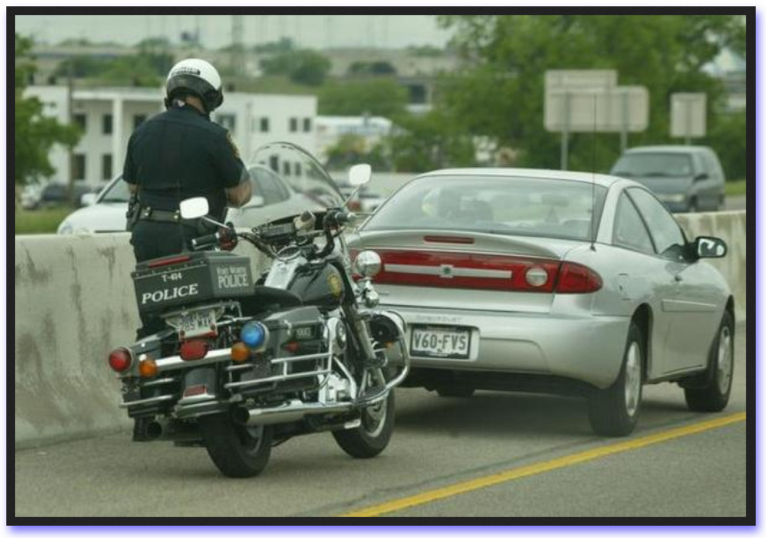 WARRANTLESS ARREST
WARRANTLESS ARREST
With
what law is that officer in...

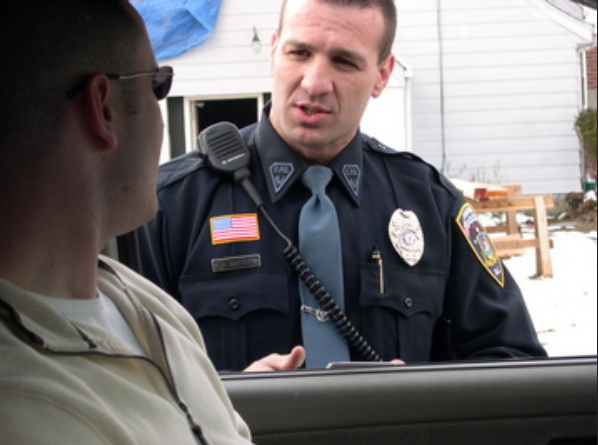


To
legally arrest and detain, the Government must assert probable cause to
believe the arrestee has committed a crime.
Serna v.
Superior Court (1985) 40 Cal.3d 239
When
the seizure of a person amounts to an arrest, it must be supported by
an arrest warrant or by probable cause. (Kaupp v. Texas,
supra,
538 U.S. at p. 630.) Probable cause exists when the facts
known
to the arresting officer would persuade someone of "reasonable caution"
that the person to be arrested has committed a crime. (Dunaway v. New
York (1979) 442 U.S. 200, 208, fn. 9.)
People
v.
Celis (2004) 33 Cal.4th 667
By its definition, probable cause can only exist
in relation to criminal conduct.
The
Ninth Circuit, as well as the Seventh and Eighth Circuits, have
recognized that probable cause can only exist in relation to criminal
conduct.
Allen v.
City
of Portland (1995) 73 F.3d 232 (9th Cir.)
[6b]
The judiciary has a solemn obligation to insure that the constitutional
right of an accused to a fair trial is realized. If that right would be
thwarted by enforcement of a statute, the statute, as in Chambers v.
Mississippi, supra, 410 U.S. 284, and Washington v. Texas, supra, 388
U.S. 14, must yield.
Hammarley
v.
Superior Court (1979) 89 Cal.App.3d 38
 CAN YOU HANDLE THE TRUTH?!
CAN YOU HANDLE THE TRUTH?!
A SO-CALLED "TRAFFIC STOP" FOR AN
INFRACTION IS A
THERE
IS NO WRITTEN AUTHORIZATION FOR ONE SO WE MADE UP A RULE AND KEEP IT TO
OURSELVES.
NOW IF YOU HAVE A PROBLEM WITH THAT YOU CAN PICK UP A WEAPON AND STAND
A POST OR BEND OVER AND KEEP LETTING US HAVE OUR WAY WITH YOU.
EITHER WAY I DON'T GIVE A DAMN WHAT YOU THINK YOU'RE ENTITLED TO.
...Hanson
violated Stevens' right not to be arrested in the absence of probable
cause to believe Stevens had committed a crime, and that right was
clearly established and would be known to a reasonable officer in the
circumstances.
Stevens
v.
Rose (2002) 298 F.3d 880, 9th Cir.
An
answer, a demurrer, and a motion to strike constitute a general
appearance (Code Civ. Proc., § 1014), since a court does not decide
questions raised by such pleadings at the behest of persons over whom
it has no jurisdiction. A court need not have
jurisdiction
over the person, however, to dismiss for lack of subject-matter
jurisdiction. Indeed, the court must dismiss on
that ground
on its own motion. (Morris v. Gilmer, 129 U.S. 315, 326-327 [9 S.Ct.
289, 32 L.Ed. 690]; Abelleira v. District Court of Appeal, 17 Cal.2d
280, 302-303 [109 P.2d 942, 132 A.L.R. 715].) Thus,
a
challenge to the subject-matter jurisdiction of the court is not
inconsistent with a challenge to personal
jurisdiction.
Moreover, since the court must dismiss on its own motion, an
appropriate challenge to subject-matter jurisdiction aids the court in
performing its duty. The defendant should therefore
be
allowed to point out lack of subject-matter jurisdiction without making
a general appearance.
Goodwine
v.
Superior Court (1965) 63 Cal.2d 481
...the
state must not profit from its own wrong. (Walder v. United States, 347
U.S. 62, 64-65 [74 S.Ct. 354, 98 L.Ed. 503, 506-507]; McDonald v.
United States, 335 U.S. 451, 456 [69 S.Ct. 191, 93 L.Ed. 153, 158-159];
People v. Martin, 45 Cal.2d 755, 760 [290 P.2d 855].)
People
v.
Parham (1963) 60 Cal.2d 378
It
has long been the law of California "that evidence obtained by such
unconstitutional means [illegal arrests, searches, and seizures] is
inadmissible at the trial [citations] and incompetent to support an
accusatory pleading [citation]." (People v. Valenti (1957) 49 Cal.2d
199, 203.)
People
v.
Sherwin (2000) No. C030485. Cal.App.4th
There
is a constitutional right to be free from criminal prosecution based
upon evidence that was illegally obtained by the government.
Devereaux
v.
Abbey (2001) 263 F.3d 1070 (9th Cir., en banc)
Even
the threat to violate a constitutional amendment taints the officer’s
conduct, so having this knowledge provides us with ammo re defending
our secured rights.
The
principle that animates these cases is simple: a search is unreasonable
— and so violates the Fourth Amendment — if its justification is
grounded in officers “engaging or threatening to engage in conduct that
violates the Fourth Amendment.” Kentucky v. King, 131 S.Ct. 1849, 1858
(2011).
UNITED
STATES
of America v. Dawud Ali SAAFIR (June 11, 2014) No.
13–4049, United States Court of Appeals, Fourth
Circuit.
(c)
The proper test follows from the principle that permits warrantless
searches: warrantless searches are allowed when the circumstances make
it reasonable, within the meaning of the Fourth Amendment, to dispense
with the warrant requirement. Thus, a warrantless
entry
based on exigent circumstances is reasonable when the police did not
create the exigency by engaging or threatening to engage in conduct
violating the Fourth Amendment.
Because
the officers in this case did not violate or threaten to violate the
Fourth Amendment prior to the exigency, we hold that the exigency
justified the warrantless search of the
apartment.
KENTUCKY
v.
KING (2011) No. 09-1272, U.S. Supreme Court
Your
municipal employees have NO AUTHORITY TO EVEN THREATEN YOU with the
denial or prejudice of your clearly established constitutionally
secured rights.
- JURISDICTION -
 QUALIFIED IMMUNITY
INTACT
QUALIFIED IMMUNITY
INTACT
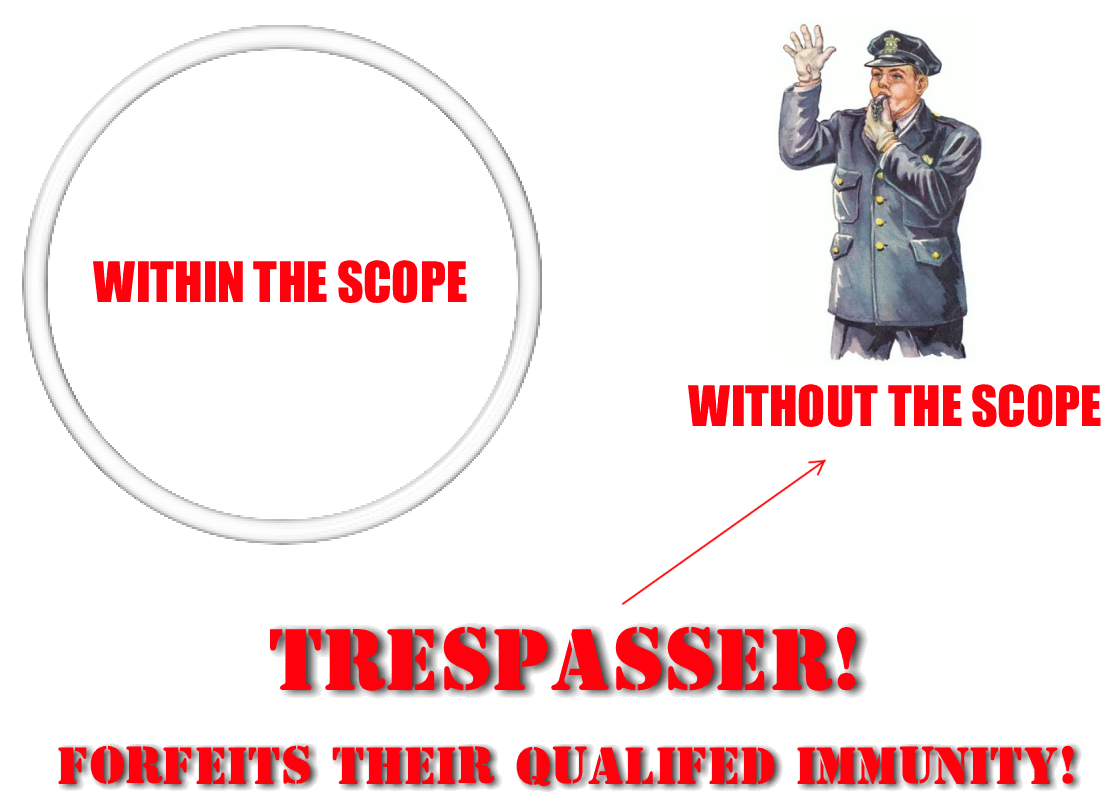
Outside
the SCOPE means the officer is acting contrary to the law he swore to
comply with and is liable in damages to the party he damaged.
As you
saw on the drive page,
speeding isn't a crime, it's
negligence. In fact that's what civil juries are
instructed
by the
judge in speeding cases because it's a civil jury instruction.
When it comes to negligence it's
UNintentional. Uh, if there's no intent then the
prosecution is gonna have one helluva time carrying their burden
because they HAVE TO prove intent. Can you say The Hillary
Defense? PUHLEEEZE TELL ME YOU CAN!
By the way, if you
want some absolutely killer law lessons about criminal law then watch
the FBI
director's hearing
conducted by the House Oversight and Government Reform Committee, where
Mr. Comey splained why after a year they just couldn't seem to locate
the INTENT for recommending a criminal prosecution.
Actually, all they had to do was look in the basement of her
house to see the intent, computers don't walk, they're carried.
You
paid for it so you might as well get something useful out of it.
"Examination of the witness"
aptly and deftly demonstrated by the
brilliant
questions posed by many of the Repukes. No, I'm a NO PARTY
member. If you've watched as many Congressional and Senate
hearings as I
have
you'd probably have the same take on those posers.
You don't know what
bullshit is
until you've watched one. When you do wear galoshes
because the stuff is deep and flowy.
The FBI
director is a former US
Attorney. By the way, both he and AG Lynch worked the same
jurisdiction in NY, isn't that nice? In any event
he
probably
knows a thing or two about crime and criminal law so it may be worth
checkin out. You can skip the Demowanks cuz all they care
about
is party politics and covering up for that lyin duplicitous adulterer
enabler who should be sitting in jail as you read this but
isn't.
If you've ever paid a parking ticket or other Vehicle Code
ticket, you've paid more that that skank ass swine.

BWUHAHAHAHAHAHAHAHAHAHAHAHAHAHAHAHA!
You
had to pay a parking ticket and nuthin happened to me for lying and
cheating and stealing and getting people killed and breaking my word
and breaching my employment contract and violating my oath of office
all the while being paid by
you chump! AND I WAS YOUR EMPLOYEE THE WHOLE TIME I
WAS
DOIN IT! Hey, sucker, can you say GOLDEN PARACHUTE?
Man, one has to wonder how much
more evidence the American people need to see before they're convinced
Queen Swine is as guilty as her husband is a philanderer.
Enough about that lyin hag.
Let's get back to you and your rights.
WHAT
RIGHTS ARE AFFECTED
BY THE ARREST?
STANFORD
LAW REVIEW
Vol. 25, June 1973
Nonarrest Automobile Stops:
Unconstitutional Seizures of the Person
B.
Individual Interests
The state interests in investigative and
inspection
stops must be balanced against the individual interests at stake in an
automobile stop. Analysis of fourth amendment case law suggests that
automobile stops may impinge on at least five of an individual's
seizure-related fourth amendment interests.
I.
Freedom from arbitrary state interference.
A motorist has a fourth amendment
interest in being
free from arbitrary state interferences," as do
nonmotorists. Ordinarily this protection is
afforded by
requiring that an "objective evidentiary justification""' single out an
individual for seizure." However, in some
circumstances
protection from arbitrary interference may be afforded if an officer
who can demonstrate that his action is legally authorized seizes
members of a class on a regularized basis."' A
motorist's
interest in freedom from arbitrary state interferences will be violated
when he is seized in circumstances which provide neither of these
guarantees against abuse of policemen's seizure powers.
2.
"Autonomous self-positioning."
An automobile stop impinges upon an
individual's
interest in making autonomous decisions to remain where he is or to go
elsewhere." Terry held that whenever an individual
has been
deprived of this autonomy he has been seized."
Obviously,
this interest is as strong for a stationary individual as for the
occupant of a moving car.
3.
Free Passage.
A moving individual has a further
interest in
liberty of movement which a stationary individual does not have-the
interest in being able to continue his movement.
The
Supreme Court recognized this interest in "free passage without
interruption" in Carroll v. United States." Carroll
arose
in the context of the stopping of an automobile to allow a search,"'
but it has also been cited by the Court in discussing stops to allow
seizures."'
Clearly any moving individual has an
interest in
free passage, but a motorist's interest is especially
strong. First, an individual utilizes a car
specifically to
enhance his personal mobility. In addition, while
anyone
can interrupt the movement of a slowly moving individual-for example, a
pedestrian - ordinarily only a policeman can stop a
motorist."' Thus, as a practical matter, the
occupant of a
moving car has greater expectations of achieving free passage. These
expectations have constitutional significance because fourth amendment
jurisprudence holds that reasonable expectations of freedom from
government interference play a role in the delineation of fourth
amendment rights.
4.
"Autonomous other-encountering."
Automobile stops also impinge upon an
individual's
interest in avoiding those whom he does not wish to
encounter." Although closely related to and often
realized
by exercise of autonomous self-positioning, this interest has distinct
content. The distinction is obscured by the fact
that a
policeman can ordinarily encounter a motorist only by interfering with
his autonomous self-positioning and freedom of
passage. The
distinct content of this interest may be seen, however, in the fact
that a policeman can encounter a stationary individual without
interfering with his autonomous self-positioning."
The
interest in autonomous other-encountering exists for both stationary
and moving individuals, but it is especially strong for a motorist
because he can almost entirely avoid undesired encounters with
individuals other than policemen.
5.
Privacy rights.
Finally, the occupant of a moving
automobile has
special fourth amendment privacy interests which stem from the
operation of fourth amendment search law. Case law
holds
that plain sight observations by policemen are not searches,"' and that
a policeman who is justifiably in a position to observe incriminating
evidence in plain sight" may arrest on that basis."
Thus a
policeman who lawfully" approaches a vehicle may arrest its occupant if
he observes illegal activity or illegal objects in plain
sight." On the other hand, search law governs a
policeman
in searching for objects not visible from outside the car.
The interaction of these doctrines gives
a motorist
greater privacy expectations than either a pedestrian or an occupant of
a stationary car has. First, a pedestrian has
neither the
degree of personal privacy afforded by an automobile's design"' or a
vehicle occupant's opportunity to conceal objects.
The
motion of a moving car further gives a motorist greater privacy than
the occupant of a stationary car has. An automobile
is only
partially enclosed and therefore only partially private; anyone may
easily approach and look into a stationary vehicle.
A
moving car, on the other hand, though not a shield from all intrusions,
is difficult to approach, and it is therefore difficult to observe its
contents. The combined factors of a vehicle's
enclosed
nature and its movement thus afford the occupant of a moving car
greater expectations of privacy than either a pedestrian or an occupant
of a stationary vehicle has.
 13 CALIFORNIA JURISPRUDENCE
3d
Constitution
Right of Privacy
Property Rights
Right to Travel
Liberty
13 CALIFORNIA JURISPRUDENCE
3d
Constitution
Right of Privacy
Property Rights
Right to Travel
Liberty
§237. Right of Privacy
The state constitution provides that all
persons
have the right to pursue and obtain privacy(14).
The California constitutional guarantees
is
motivated by concern over contemporary society’s accelerating
encroachment on personal freedom and security caused by increased
surveillance and data collection(18). It exists to prevent
governmental snooping, to inhibit the overly broad collection and
retention of unnecessary personal information(17)...
Ibid. p.
527
...the right of privacy had been
recognized as a fundamental right in this state.
...right of privacy guaranteed by the
state
constitution is much broader than the privacy guaranteed by the federal
Constitution(23).
...it is the right of a person to lead
his or her
private life without intrusion the government.
§238.
Right to Travel
The nature of the federal union and of
constitutional concepts of personal liberty unite to require that all
citizens be free to travel throughout the length and breadth of the
United States uninhibited by statutes, rules, or regulations that
unreasonably burden or restrict this movement(42).
And the constitutional right to travel
between the
states implies a correlative constitutional right to travel within a
state(46).
Ibid. p. 538
§239.
Property Rights
This constitutional provision refers to
the right to
acquire and possess the absolute and unqualified title to every species
of property recognized by law, with all rights incidental thereto(55).
Ibid. p. 540
The right of protecting property is not
the simple
right to protection by individual physical force, but is the right to
protect property by the law of the land and the force of the body
politic(57).
Both state(58) and federal(59)
constitutions
prohibit the state from depriving a person of property without due
process of law(60).
Thus, before a person may be deprived of
any
significant interest, he or she must be afforded notice and an
opportunity for a hearing(62).
Ibid. pgs. 541 - 542
B.
LIBERTY [§§243 - 245]
Summary
The right to liberty consists of the
right to be
free from arbitrary personal restraint as well as the right to do such
acts as a person may judge best for his interests, and the right of a
person to be free in the enjoyment of all his faculties (§243).
Ibid. p. 552
§243.
In general
Personal liberty is a fundamental
interest, second
only to life itself, protected under both the California and the United
States Constitutions(17). The term “liberty” as used in the
state
and federal constitutions(18) consists partially of the right to be
free from arbitrary personal restraint(19). For example, the
right of a citizen to drive on a public street with freedom from police
interference, unless he or she is engaged in suspicious conduct
associate in some manner with criminality, is a fundamental
constitutional right(20).

[2]
The people of the State of California are supreme and
have the undoubted right to protect themselves and to preserve the form
of government...
Steiner
v.
Darby (1948) 88 Cal.App.2d 481

Persons
dealing with a public agency are presumed to know the law and are bound
at their peril to ascertain and follow those procedures necessary to
enter into a binding contract. (See Miller v. McKinnon, supra, 20
Cal.2d at p. 89; Bear River etc. Corp. v. County of Placer (1953) 118
Cal.App.2d 684 , 690 [258 P.2d 543].)
SEYMOUR
v.
STATE OF CALIFORNIA, 156 Cal.App.3d 200
[Civ. No. 22606. Court of Appeals of California,
Third Appellate District. March 9, 1984.]
"Everyone
is presumed to know the law. And all applicable
laws in
existence when an agreement is made necessarily enter into it and form
a part of it as fully as if they were expressly referred to and
incorporated in its terms." (6 Cal.Jur. 310, § 186; Brown v. Ferdon, 5
Cal.2d 226 [54 P.2d 712]; Chapman v. Jocelyn, 182 Cal. 294
[187
P. 962]; Long v. Newman, 10 Cal.App. 430 [102 P. 534].)
The contracting parties were, therefore, presumed
to know all existing laws...
Robertson
v.
Dodson, 54 Cal.App.2d 661
[Civ. No. 12069. First Dist., Div. One. Oct. 2,
1942.]
We
thus require citizens to apprise themselves not only of statutory
language but also of legislative history, subsequent judicial
construction, and underlying legislative purposes (People v. Grubb
(1965) 63 Cal.2d 614, 620 [47 Cal.Rptr. 772, 408 P.2d 100]). (See
generally Amsterdam, The Void-For-Vagueness Doctrine in the Supreme
Court (1960) 109 U. Pa. L.Rev. 67.)
Walker
v.
Superior Court (1988) 47 Cal.3d 112
CALIFORNIA
CIVIL CODE
1708.
Every person is bound, without contract, to abstain from injuring the
person or property of another, or infringing upon any of his or her
rights.
As
is the case of illegal arrests, the officer is bound to know these
fundamental rights and privileges, and must keep within the
law
at his peril.
Thiede
v.
Town Of Scandia Valley, 217 Minn. 218. 231 (1944)
“...one who interferes with another's liberty
does so at his peril”.
Knight
v.
Baker, 117 Ore. 492, 244 Pac. 543, 544 (1926).
"One who interferes with another's
liberty does so at his peril."
University
of Pennsylvania Law Review, vol. 75, p.
491, April 1927.
One who interferes with another’s liberty does so
at his peril.
McBeath
v.
Campbell, 12 S.W.2d 118, 122 (1929)
When
the plaintiff has shown that he was arrested, imprisoned or
restrained of his liberty by the defendant, "the
law
presumes it to be unlawful."
People
v.
McGrew (1888)
77 Cal. 570

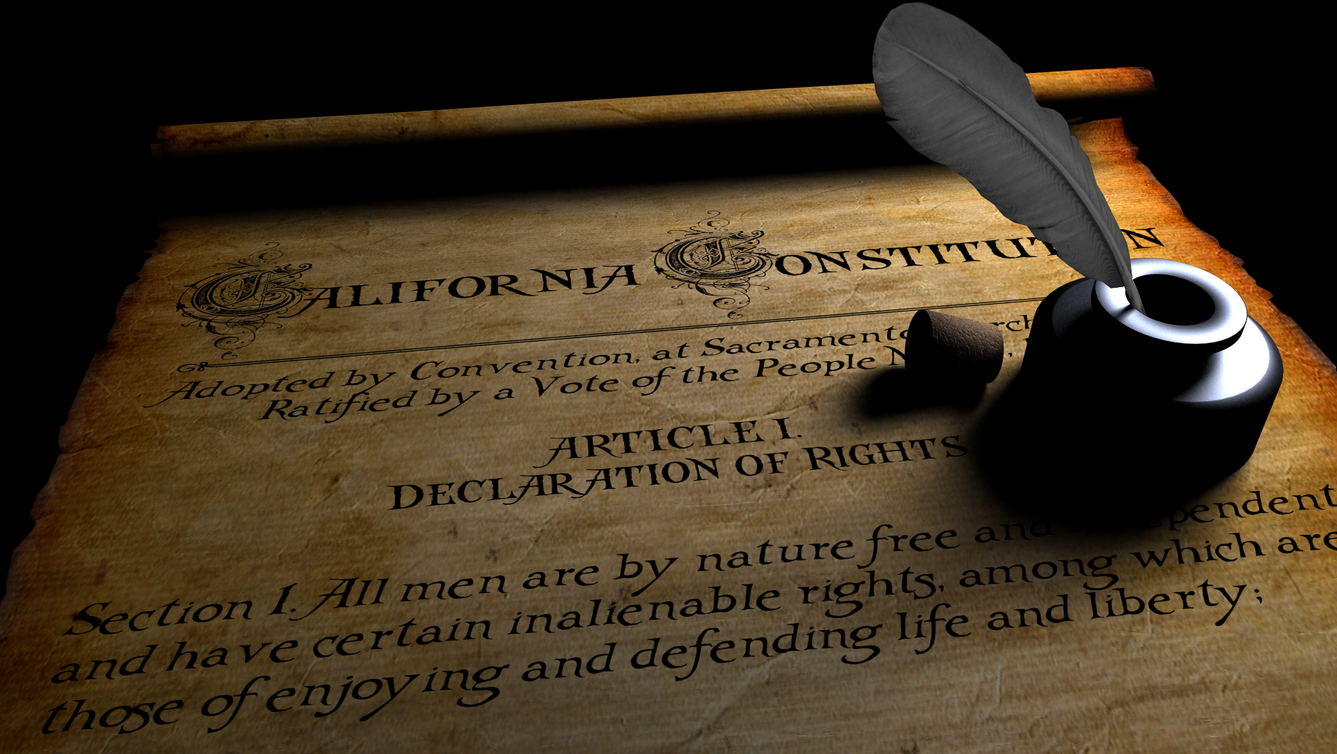
CONSTITUTION
OF THE STATE OF CALIFORNIA,
1849
We
the people of California, grateful to Almighty; God for our freedom: in
order to secure its blessings, do establish this Constitution.
Article I: Declaration of Rights
Sec. 1.
All men are by nature free and
independent, and have certain
unalienable rights, among which are those of enjoying and defending
life and liberty: acquiring, possessing and protecting property: and
pursuing and obtaining safety and happiness.
Sec.
6.
Excessive bail shall not be required,
nor excessive fines imposed,
nor shall cruel or unusual punishments be inflicted, nor shall
witnesses be unreasonably detained.
Sec.
8.
No person shall be subject to be twice
put in jeopardy for the same
offence; nor shall he be compelled, in any criminal case, to be a
witness against himself, nor be deprived of life, liberty, or property,
without due process of law; nor shall private property be taken for
public use without just compensation.
Sec.
10.
The people shall have the right freely
to assemble together, to
consult for the common good, to instruct their representatives, and to
petition the legislature for redress of grievances.
Sec.
19.
The right of the people to be secure in
their persons, houses,
papers and effects, against unreasonable seizures and searches, shall
not be violated;
Sec.
21.
This enumeration of rights shall not be
construed to
impair or deny others, retained by the people.
Summary of California Law, vol 7,
Constitutional Law, p. 9
B.
Constitution of California
2. ['51] Restrictive and Enabling
Provisions
(a)
Restrictions on State Powers. The California Constitution,
like other
state constitutions, is generally a restriction upon the powers of the
state.
...the state Constitution, as distinguished from
the
federal Constitution, does not constitute a grant of power, or an
enabling act, to the legislature, but rather constitutes a limitation
upon the powers of that body....we do not look to the Constitution to
determine whether the legislature is authorized to do an act, but only
to see if it is prohibited. In other words, unless restrained
by
constitutional provision, the legislature is vested with the whole of
the legislative power of the state. (Macmillan Co. v. Clarke, 184 Cal.
491 [194 P. 1030, 17 A.L.R. 288]; Mitchell v. Winnek, 117 Cal. 520, 525
[49 P. 579]; Jensen v. McCullough, 94 Cal.App. 382, 394 [271 P. 568];
People v. Rinner, 52 Cal.App. 747, 749 [199 P. 1066].)
Fitts v.
Superior Court, 6 Cal.2d 230
[L. A. No. 15256. In Bank. April 30, 1936.]
...the
fact that our Constitution is not a grant of power but rather a
limitation or restriction upon the powers of the Legislature (In re
Madera Irr. Dist., 92 Cal. 296 [28 P. 272, 675, 29 Am.St.Rep. 106, 14
L.R.A. 755]; Macmillan Co. v. Clarke, 184 Cal. 491 [194 P. 1030, 17
A.L.R. 288]; People ex rel. Smith v. Judge of the Twelfth District, 17
Cal. 547; Sheehan v. Scott, 145 Cal. 684 [79 P. 350]; Fitts v. Superior
Court, 6 Cal.2d 230 [57 P.2d 510]; Mitchell v. Winnek, 117 Cal. 520 [49
P. 579]) and "that we do not look to the Constitution to determine
whether the Legislature is authorized to do an act, but only to see if
it is prohibited." (Fitts v. Superior Court, supra.)
Collins
v.
Riley, 24 Cal.2d 912
[S. F. No. 17019. In Bank. Oct. 2, 1944.]
CALIFORNIA
GOVERNMENT CODE
4. No
action or proceeding commenced before this code takes effect, and no
right accrued, is affected by this code,...
VEHICLE
CODE
Pending
Proceeding and Accrued
Rights
4.
No action or proceeding commenced before this code takes effect, and no
right accrued, is affected by the provisions of this
code,...
CIVIL
CODE
6. No
action or proceeding commenced before this Code takes effect, and no
right accrued, is affected by its provisions.
GOVERNMENT
CODE
100.
(a) The sovereignty of the state resides
in the
people thereof, and all writs and processes shall issue in their name.
(b) The style of all process shall be "The People of the
State of California," and all prosecutions shall be conducted in their
name and by their authority.
6250.
In enacting this chapter, the Legislature, mindful of the right of
individuals to privacy, finds and declares that access to information
concerning the conduct of the people's business is a fundamental and
necessary right of every person in this state.
11120.
It is the public policy of this state that public agencies exist to aid
in the conduct of the people's business and the proceedings of public
agencies be conducted openly so that the public may remain informed.
In
enacting this article the Legislature finds and declares that it is the
intent of the law that actions of state agencies be taken openly and
that their deliberation be conducted openly.
The
people of this state do not yield their sovereignty to the agencies
which serve them. The people, in delegating authority, do not give
their public servants the right to decide what is good for the people
to know and what is not good for them to know. The people insist on
remaining informed so that they may retain control over the instruments
they have created.
This article shall be known and may be cited as
the Bagley-Keene Open Meeting Act.
54950
DECLARATION OF LEGISLATIVE PURPOSE.
"In enacting this chapter, the Legislature finds and declares that the
public commissions, boards and councils and the other public agencies
in this State exist to aid in the conduct of the people's
business. It
is the intent of the law that their actions be taken openly and that
their deliberations be conducted openly.
The
people of this State do not yield their sovereignty to the agencies
which serve them. The people, in delegating authority, do not give
their public servants the right to decide what is good for the people
to know and what is not good for them to know. The people
insist on
remaining informed so that they may retain control over the instruments
they have created".
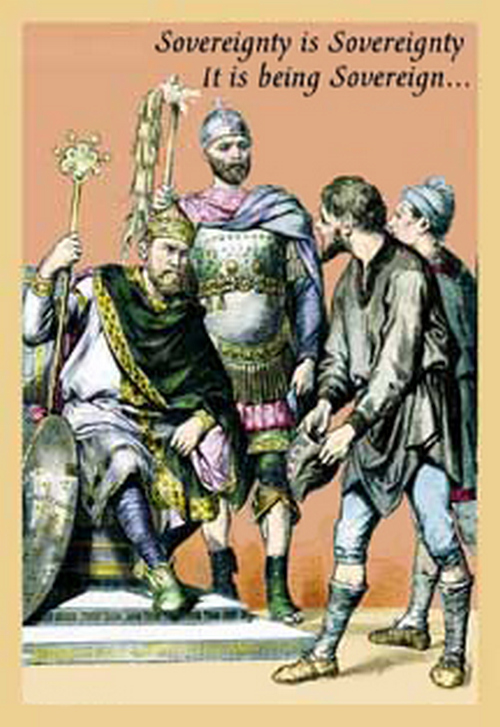



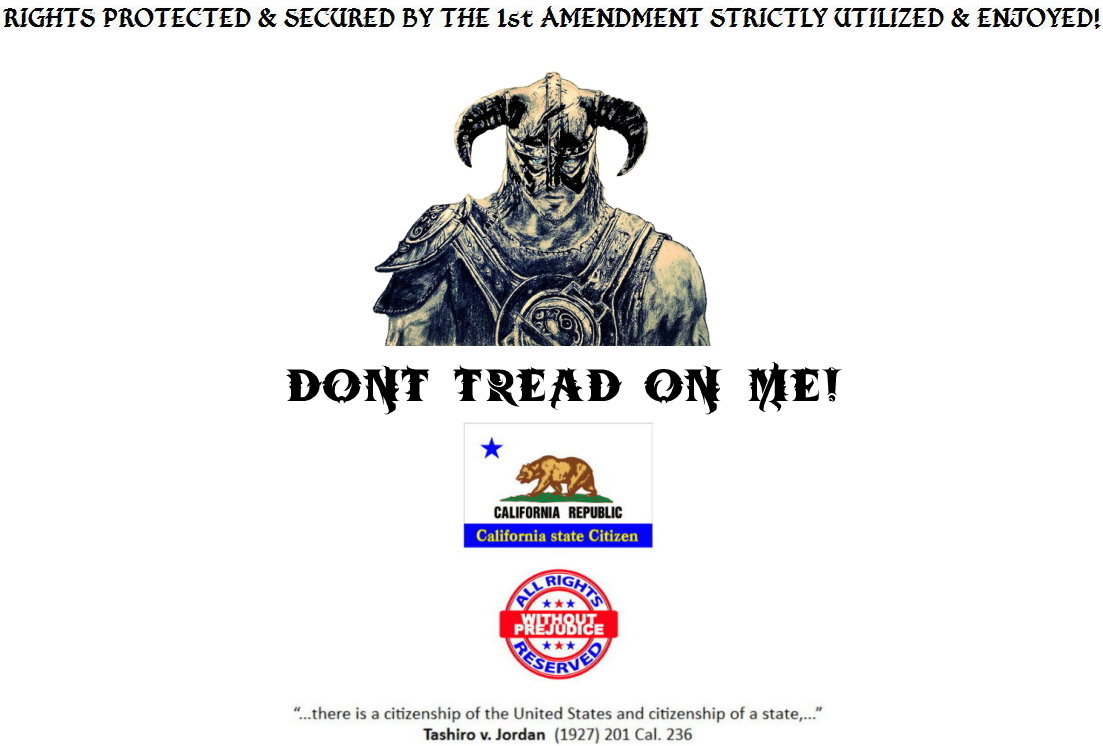
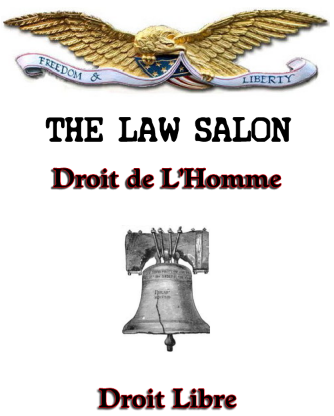


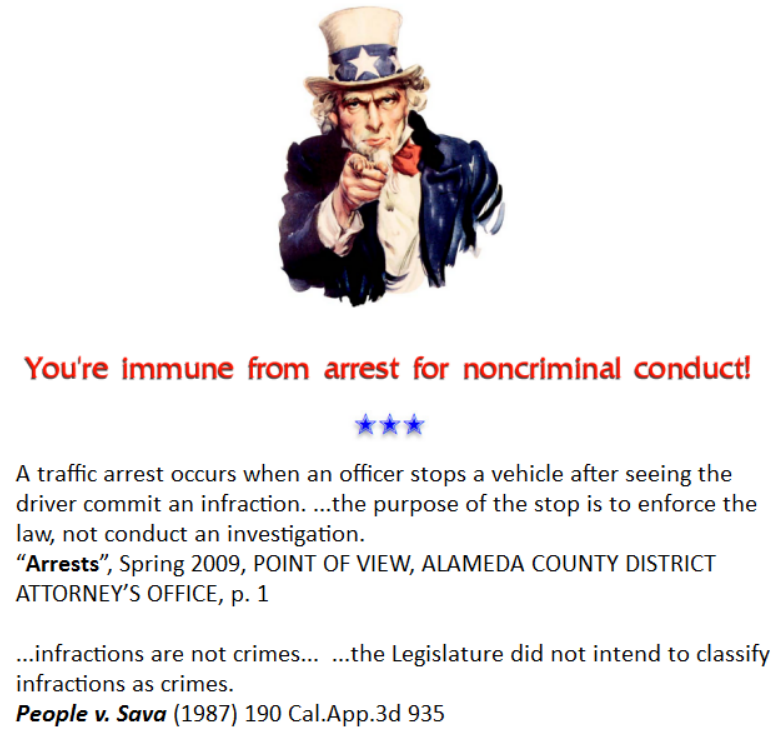








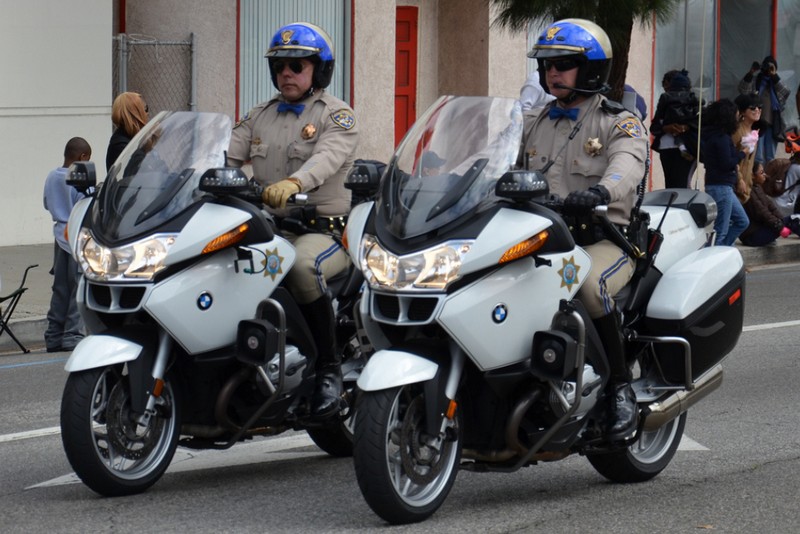














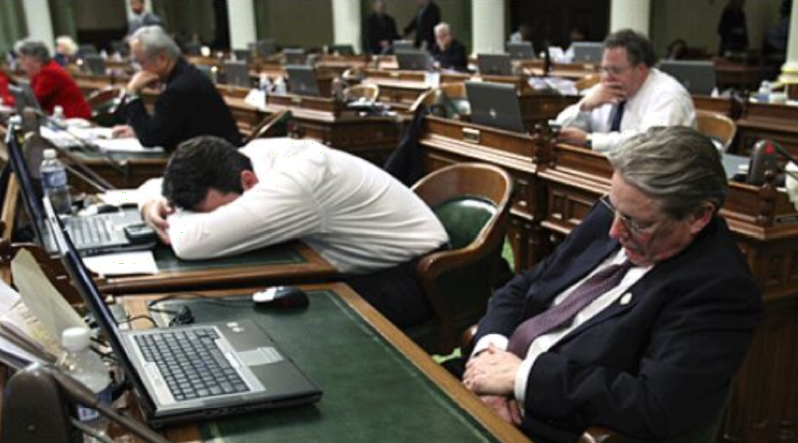
































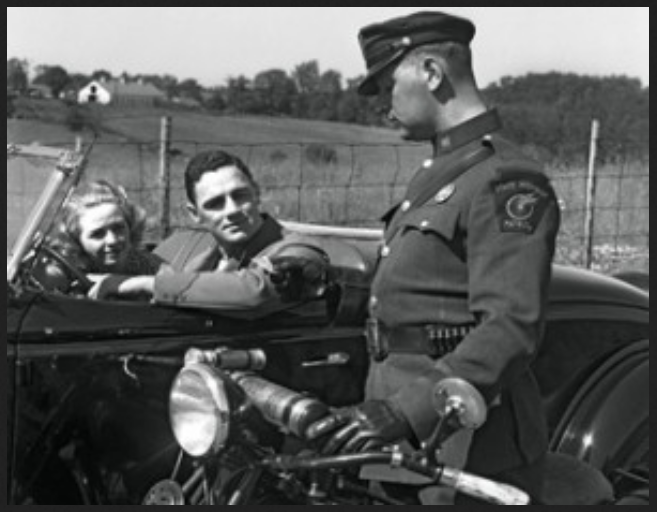


 "...infractions are not crimes... ...the
Legislature
did not intend to classify infractions as crimes."
"...infractions are not crimes... ...the
Legislature
did not intend to classify infractions as crimes."










